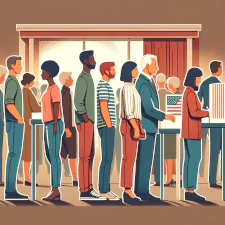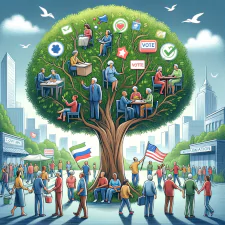In society, civic duty forms the threads that bind us together, ensuring the smooth functioning and stability of our communities. But what exactly is civic duty, and why does it hold such importance in our daily lives?
Key Takeaways
- Community Involvement: Civic duty fosters community involvement and strengthens democratic values.
- Legal and Moral Responsibilities: Civic duties are legally required, while civic responsibilities are voluntary but essential for societal well-being.
- Educational Role: Education is crucial in promoting awareness and understanding of civic duties and responsibilities.
Table of Contents
- What is Civic Duty?
- Civic Duty vs Civic Responsibility
- Why is it Important to Fulfill our Obligations of Citizenship?
- Synonyms for Civic Duty
- What Does it Mean to be a Responsible Citizen?
- Is Voting a Civic Duty?
- The Responsibilities of Citizens
- What does it mean to do your civic duty?
- Encouraging Civic Engagement
- Civic engagement
- Quotes About Civic Engagement
- The Future of Civic Duties
- Civic or Civil Duty
- Exploration of Civic Duty
- Just Doing My Civic Duty Sir!
- Civic Duty: Roles, Responsibilities, and Real-World Examples
- Frequently Asked Questions:
What is Civic Duty?
At its core, civic duty refers to the responsibilities and obligations that each citizen owes to their community and nation. These duties, encompassing a range of actions from voting to community service, are essential for the sustenance of democratic values and the overall health of society.
Civic Duty vs Civic Responsibility
The terms “civic duty” and “civic responsibility” are closely related and often used interchangeably, but they do have distinct meanings:
- Civic Duty
- Definition: A civic duty is a legal obligation that is required by law. Failure to fulfill these duties typically results in legal consequences.
- Examples:
- Voting in elections (mandatory in some countries)
- Serving on a jury when summoned
- Paying taxes
- Obeying laws
- Registering for selective service (in countries with conscription)
- Key Aspect: Civic duties are often enforceable by law and are considered mandatory for citizens.
- Civic Responsibility
- Definition: A civic responsibility is a social obligation that is perceived as important for the benefit of the community and society, but it is not legally required. These responsibilities are based on ethics and morality rather than law.
- Examples:
- Volunteering in the community
- Participating in community activities or town meetings
- Staying informed about current events and issues
- Voting in elections (in countries where it is not mandatory)
- Advocating for social, environmental, or political change
- Key Aspect: Civic responsibilities are voluntary actions taken to contribute to the health and improvement of the community and society.
Civic duties are legal obligations that every citizen is required to fulfill, while civic responsibilities are voluntary actions that are encouraged for the betterment of society. Both play a critical role in maintaining a functioning, healthy democracy and community.
Why is it Important to Fulfill our Obligations of Citizenship?
Understanding Civic Duty
The term ‘Civic Duty’ encompasses the responsibilities and obligations that citizens owe to their society. It’s a concept rooted in the philosophy of being a part of a larger community, where each individual’s actions contribute to the collective well-being and governance. Civic duty is about participation in the social and political spheres, ensuring the community’s and country’s smooth functioning.
Synonyms for Civic Duty
Here are some synonyms for “Civic Duty”:
- Civic Responsibility
- Community Obligation
- Public Duty
- Social Responsibility
- Citizen’s Duty
- Civic Commitment
- National Service
- Patriotic Duty
- Civic Obligation
- Community Service
Each of these terms conveys the idea of responsibilities or obligations that individuals have towards their community and society as a whole.
What Does it Mean to be a Responsible Citizen?
Being a responsible citizen involves a blend of civic duties, civic responsibilities, ethical behavior, and active participation in the welfare of one’s community and country. Here are key aspects of what it means to be a responsible citizen:
- Adherence to Laws and Regulations: Abiding by the laws of the land is a fundamental aspect of being a responsible citizen. This includes everything from following traffic rules to adhering to national regulations.
- Participation in the Democratic Process: Engaging in the democratic process, which includes being informed about issues, voting in elections, and respecting the outcomes of these processes.
- Community Involvement: Contributing to the betterment of one’s community through volunteering, participating in local events, and supporting community initiatives.
- Paying Taxes: Fulfilling financial obligations to the government honestly and on time, which is crucial for funding public services and infrastructure.
- Respecting the Rights of Others: Acknowledging and respecting the rights and beliefs of others, even if they differ from one’s own. This includes promoting tolerance, diversity, and inclusion.
- Environmental Stewardship: Taking actions that contribute to the sustainability of the planet, like recycling, conserving resources, and supporting environmental initiatives.
- Education and Lifelong Learning: Staying informed and educated about local, national, and global issues, and continually seeking to broaden one’s understanding of the world.
- Ethical Conduct: Acting with integrity and honesty in both personal and professional spheres, and making decisions that consider the welfare of the wider community.
- Civic Engagement: Being involved in civic matters, which can range from attending town hall meetings to advocating for social or political causes.
- Responsibility for Personal Actions: Accepting accountability for one’s actions and understanding the impact they can have on others and the community.
- Supporting and Respecting Public Services and Institutions: Recognizing the role of public services and institutions and supporting their efforts in maintaining social order and public welfare.
- Promoting the Public Good: Advocating and working towards policies and practices that benefit the wider community and not just individual interests.
In essence, being a responsible citizen means actively contributing to the well-being and functioning of the society in which one lives, not only through obligatory duties but also through voluntary actions that foster a sense of community, promote social justice, and sustain the environment.
Historical Context
Historically, the concept of civic duty has evolved significantly. In ancient civilizations, civic duties often involved direct participation in decision-making processes, like the assemblies of ancient Greece. As societies evolved, the nature of these duties changed, adapting to the complexities of modern governance. Today, civic duty encompasses not only political engagement but also social responsibilities, environmental stewardship, and ethical conduct within a community.
Civic Experience

Civic experience” refers to the involvement and participation of an individual in activities related to the governance, improvement, and well-being of their community, society, or nation. It encompasses a range of activities and engagements that contribute to the public good and the democratic process. Here are various aspects and examples of civic experience
In contemporary times, civic duty has expanded to include a range of activities and responsibilities. Voting in elections is a primary example, enabling citizens to have a voice in their government’s direction.
However, civic duty also includes obeying laws, serving on juries, paying taxes, and respecting the rights of others. Beyond legal obligations, civic duty involves moral responsibilities like volunteering, participating in community service, and staying informed about local and national issues.
The significance of civic duty in modern society cannot be overstated. It’s a pillar that supports democratic values, ensuring that citizens not only enjoy the rights granted by their government but also actively participate in the governance process. This participation is crucial for the health of any democracy, as it ensures accountability, transparency, and responsiveness from elected officials.
Civic duties also foster a sense of community and belonging. By engaging in activities that benefit the larger society, individuals strengthen the bonds that hold communities together. This sense of collective responsibility and mutual support is vital for addressing social challenges and building resilient, thriving societies.
Civic experience is not only about participation but also about the impact and learning that comes from being actively involved in the civic life of one’s community and country. It contributes to personal growth, a stronger community, and a more robust democracy.
Is Voting a Civic Duty?

One of the most fundamental civic duties is participating in elections. Voting is the cornerstone of a democratic society, allowing citizens to have a say in who represents them in government. It’s not just a right but a responsibility to make informed choices that shape the future of the community, region, and nation.
What is one legal responsibility of American Citizens?
Jury Service

Serving on a jury is another critical civic duty. It plays a vital role in the judicial system, ensuring that the principle of a fair trial by a jury of one’s peers is upheld. Jury service allows citizens to participate directly in the legal process, contributing to the administration of justice.
Paying Taxes
The obligation to contribute financially to the community through taxes is essential. Taxes fund public services like education, healthcare, infrastructure, and security. Paying taxes is a civic duty that supports the common good and ensures the proper functioning of government services.
Staying Informed About Local and National Issues
An informed citizenry is crucial for a healthy democracy. Staying updated on local and national issues enables individuals to make educated decisions, especially during elections. It also equips citizens to hold their representatives accountable and to actively participate in public discourse.
Other Civic Duties
- Obeying Laws: Adhering to the law is a basic civic duty. It ensures order and safety in society.
- Community Service: Volunteering and engaging in community service projects benefit society and foster a sense of solidarity.
- Respecting the Rights of Others: Civic duty also encompasses respecting the rights and beliefs of other individuals, promoting tolerance and understanding in a diverse society.
- Environmental Stewardship: Protecting the environment and engaging in sustainable practices is increasingly recognized as a crucial civic responsibility.
- Participating in Civil Discourse: Engaging in respectful and constructive dialogue about societal issues contributes to a more informed and cohesive community.
- Emergency Response: In times of crisis, such as natural disasters, citizens must respond and assist in recovery efforts, whether through direct action or supporting relief organizations.
These duties collectively contribute to the functioning and improvement of society. They foster a sense of belonging and investment in the community’s welfare, encouraging active participation in civic life. Understanding and fulfilling these duties are essential for the sustained growth and health of any democratic society.
The Responsibilities of Citizens
Legal vs. Moral Civic Responsibilities
Civic responsibilities can be categorized into two main types: legal and moral. Legal responsibilities are those mandated by law, such as obeying traffic rules or paying taxes. Failure to adhere to these can result in legal consequences.
On the other hand, moral responsibilities are guided by ethical and societal values, like volunteering or being a considerate neighbor. These are not legally enforced but are crucial for societal harmony and the betterment of communities.
Examples of Civic Responsibilities
- Obeying Laws: A fundamental legal responsibility, obeying laws ensures order and safety in society.
- Respecting Others’ Rights: This involves acknowledging and valuing the rights and freedoms of others, essential for a respectful and tolerant community.
- Community Involvement: Actively participating in community activities, whether through local governance, schools, or neighborhood groups, strengthens communal bonds.
- Voting: As both a right and a responsibility, voting in elections is critical for representing citizens’ voices in a democratic society.
- Jury Duty: Serving on a jury when called upon ensures the justice system operates fairly and impartially.
- Environmental Care: Taking steps to protect the environment, like recycling and conserving energy, reflects a moral responsibility towards future generations.
- Educational Engagement: Staying informed and educated about societal issues and participating in the educational system, whether as students, parents, or community members, are vital for an enlightened and progressive society.
Role of Education in Promoting Civic Responsibilities
Education plays a critical role in cultivating civic responsibilities. Schools and educational institutions are not just about imparting academic knowledge; they are crucial for instilling values of citizenship, ethics, and community engagement.
Through education, individuals learn about their rights and responsibilities, the importance of active participation in society, and the skills necessary to contribute positively to their communities.
The Impact of Civic Responsibilities
Fulfilling civic responsibilities has a profound impact on the health and well-being of society. It leads to more engaged, informed, and cohesive communities, where individuals feel connected to and invested in their collective future. Moreover, it fosters a culture of mutual respect, understanding, and collaboration, essential for addressing social challenges and promoting sustainable development.
the responsibilities of citizens encompass a wide range of actions and behaviors, from legal obligations to moral commitments. These responsibilities are the bedrock of a functional and harmonious society, and their fulfillment is essential for the continued prosperity and stability of communities and nations. Through education and active engagement, individuals can understand and execute their civic duties, contributing to a vibrant, responsive, and responsible society.
What does it mean to do your civic duty?
Case Studies of Civic Engagement
- Civic Technology for Enhanced Citizen-Government Interaction: In Boston, the BOS:311 app is a prime example of civic technology. This app allows Bostonians to report non-emergency issues like potholes and noise disturbances, enhancing service delivery and fostering community involvement. The app’s success highlights how technology can be used to improve civic engagement and strengthen the relationship between citizens and government.
- Participatory Budgeting: Paris is known for its participatory budgeting initiative, where citizens are involved in allocating a portion of the city’s capital budget. Since 2014, Parisians have had a say in how budget funds are used, enabling them to propose and vote on various projects. This approach empowers communities and nurtures a sense of shared responsibility in decision-making.
Social Media Civic Activism:

- #DressLikeAWoman Campaign: This campaign emerged in response to an alleged statement by President Trump asking his staff to “dress like women.” The hashtag became a rallying point on social media, with users sharing diverse images of women in various professional and personal attire, challenging gender norms and stereotypes.
- #StopFundingHate: This UK grassroots activism campaign aimed to counteract the anti-migrant positions of several British newspapers. It gained traction online, leading to significant outcomes, such as Lego and the Body Shop ceasing their promotional giveaways and advertisements with certain publications.
- #YouAintNoMuslimBruv: Originating in London, this hashtag became a symbol of unity and rejection of Islamophobia following a terror attack. It was used widely on social media to highlight the non-Islamic nature of terrorism, showcasing the power of digital platforms in shaping public discourse.
- #HeForShe: Launched by UN Women and backed by notable figures like Emma Watson and Justin Trudeau, this campaign focuses on involving men and boys in gender equality efforts. The campaign leverages social media to spread its message and encourage pledges from around the world.
- #WomensMarch: The 2017 Women’s March, marked by its massive global participation, was largely coordinated and amplified through social media. The hashtag united millions of women and allies, advocating for gender equality and other social issues.
- #BlackLivesMatter: Originating from a Facebook post, this hashtag grew into a global movement addressing racial injustice and inequality. It demonstrates the power of social media in bringing together people from diverse locations for a common cause.
- #ASLIceBucketChallenge: This viral challenge involved people pouring ice-cold water over their heads to raise awareness and funds for ALS (Amyotrophic Lateral Sclerosis). It became a social media sensation, significantly boosting donations for ALS research.
- #BringBackOurGirls: Following the abduction of 276 schoolgirls by Boko Haram in Nigeria, this hashtag was used globally to demand their return. The widespread use of the hashtag brought international attention to the incident and the broader issue of violence against women and girls.
These examples illustrate the varied and impactful ways in which social media can be leveraged for activism, from raising awareness and challenging societal norms to influencing policy changes and mobilizing for collective action
- Climate Change Activism: The Fridays for Future movement, initiated by Greta Thunberg, encourages students to skip school on Fridays to demand government action on climate change. This global movement underscores the role of youth in civic engagement and the importance of addressing environmental issues.
- Co-Creation in Public Services: Helsinki, Finland, has embraced a co-creation model for public services. The city conducts workshops involving citizens in designing services ranging from healthcare to local development plans. This approach promotes community ownership and responsibility, showcasing an inclusive model of governance.
- Community Response to Natural Disasters: In the wake of natural disasters, communities often come together in extraordinary ways. For example, during the floods in a small town, residents formed volunteer groups for rescue and rehabilitation, showcasing the power of community involvement and the spirit of civic duty in action.
- Grassroots Movements and Social Change: The role of civic engagement in driving social change can be seen in movements like the fight for civil rights or environmental conservation. These movements often start with individual citizens recognizing a societal issue and taking action, eventually leading to significant policy changes.
Civic Action Project Ideas that reflect civic engagement include:

- Establishing community gardens to promote sustainable agriculture and foster community engagement.
- Implementing plastic waste reduction campaigns to combat plastic pollution.
- Organizing voter registration drives to promote participation in the electoral process.
- Initiatives supporting homelessness, providing resources and assistance to those in need.
These real-world examples serve to illustrate the broad spectrum of civic duties and their profound impact on both local and global scales. They demonstrate how individual actions, when guided by a sense of responsibility towards one’s community and nation, can lead to significant positive changes in society. Through these narratives and analyses, the concept of civic duty becomes more tangible and inspiring, encouraging readers to reflect on and engage in their civic responsibilities.
Encouraging Civic Engagement
Role of Governments and Organizations in Promoting Civic Duties
- Educational Programs and Campaigns: Governments and organizations often implement educational initiatives to encourage civic engagement. For instance, voter education campaigns aimed at increasing electoral participation, especially among young and first-time voters.
- Community Involvement Programs: Many local governments organize community involvement programs, like neighborhood clean-up drives or town hall meetings, to foster a sense of community and encourage active participation in local governance.
Media’s Role in Fostering Civic Awareness
- Informative Journalism: Media plays a crucial role in keeping citizens informed about local, national, and international issues. Ethical and investigative journalism can highlight societal needs and encourage civic action.
- Public Service Announcements: Media outlets often collaborate with governments and NGOs to disseminate public service announcements that promote civic responsibilities like voting, recycling, and obeying traffic laws.
Overcoming Challenges to Civic Engagement
- Addressing Apathy: One of the significant challenges to civic engagement is apathy. Governments and organizations can address this by making civic participation more accessible and engaging. For example, implementing online voting systems or interactive civic education programs.
- Bridging the Digital Divide: In an increasingly digital world, ensuring that all citizens have access to digital resources is crucial for civic engagement. Efforts to bridge the digital divide, such as providing public internet access and digital literacy programs, are essential.
The Power of Role Models
- Influential Figures Promoting Civic Duties: Public figures and influencers often play a vital role in encouraging civic duties. When well-known personalities engage in civic activities, they can inspire their followers to do the same.
- Celebrating Civic-Minded Individuals: Recognizing and celebrating individuals who exemplify strong civic engagement can motivate others. Awards and public recognition for community service or outstanding civic contributions can serve as significant encouragement.
Civic engagement
A crucial element in building and maintaining a healthy, functioning democracy, has inspired many thought-provoking quotes. Here are some notable ones:
Quotes About Civic Engagement
Margaret Mead: “Never doubt that a small group of thoughtful, committed citizens can change the world. Indeed, it is the only thing that ever has.”
Barack Obama: “Change will not come if we wait for some other person or some other time. We are the ones we’ve been waiting for. We are the change that we seek.”
John F. Kennedy: “Ask not what your country can do for you – ask what you can do for your country.”
Martin Luther King Jr.: “Everybody can be great…because anybody can serve. You don’t have to have a college degree to serve. You don’t have to make your subject and verb agree to serve. You only need a heart full of grace. A soul generated by love.”
Nelson Mandela: “It is in your hands to create a better world for all who live in it.”
Aristotle: “The essence of life is to serve others and do good.”
Mahatma Gandhi: “The best way to find yourself is to lose yourself in the service of others.”
Jane Addams: “The good we secure for ourselves is precarious and uncertain until it is secured for all of us and incorporated into our common life.”
These quotes encapsulate the spirit of civic engagement, emphasizing the importance of individual action, community service, and collective responsibility for societal improvement.
Future Trends in Civic Engagement
- Digital Engagement Platforms: The rise of digital platforms offers new avenues for civic engagement. From online petitions to virtual town halls, technology is providing more accessible and diverse ways for citizens to participate in civic life.
- Youth Involvement: Encouraging youth participation in civic duties is essential for future engagement. Schools and youth organizations play a crucial role in this, providing opportunities for young people to engage in community service and civic education.
Encouraging civic engagement is a multi-faceted effort involving governments, organizations, media, and influential individuals. By addressing challenges and leveraging modern tools and platforms, these entities can inspire and facilitate active civic participation. This engagement is crucial for fostering a vibrant, responsive, and inclusive society where every citizen feels empowered to contribute to the common good.
The Future of Civic Duties
Evolving Concepts in a Changing World
- Globalization and Digitalization: The rapid pace of globalization and digitalization is reshaping the concept of civic duties. The interconnectedness of the world today means that civic responsibilities now extend beyond national borders, encompassing global issues like climate change and human rights.
- Technological Influence: Technology is transforming how civic duties are performed. Online voting, digital activism, and social media campaigns are becoming more prevalent, offering new platforms for civic engagement.
Emerging Trends in Civic Engagement
- Digital Participation: The rise of digital platforms has opened up new avenues for civic engagement. Online petitions, social media advocacy, and virtual town hall meetings are making it easier for citizens to voice their opinions and participate in governance from afar.
- Youth-Led Movements: There’s a growing trend of youth-led movements worldwide, addressing issues ranging from climate change to social justice. This indicates a shift towards a more active, engaged younger generation in civic duties.
The Potential Impact of Technology on Civic Duties
- Enhanced Accessibility and Inclusivity: Technology can make civic participation more accessible and inclusive. For example, apps and websites that make it easier to vote or provide information on civic issues can engage broader segments of the population.
- Challenges of Misinformation: However, the rise of digital platforms also brings challenges, such as the spread of misinformation. Ensuring the reliability and credibility of information is crucial for informed civic engagement.
Future Challenges and Opportunities
- Educating for a Digital Age: As civic duties evolve, so too must our approach to civic education. Future citizens will need to be digitally literate and aware of global issues, requiring a revamp of current educational curriculums to include these aspects.
- Balancing Technology and Personal Connection: While technology provides new opportunities for engagement, maintaining a personal connection to civic duties is essential. Encouraging face-to-face community interactions and grassroots movements remains vital.
Sustaining Civic Engagement in a Rapidly Changing World
- Adapting to Societal Changes: Civic duties must adapt to societal changes, including demographic shifts, cultural transformations, and evolving societal norms. This adaptation is crucial for keeping civic engagement relevant and effective.
- Innovative Policies and Practices: Governments and organizations need to develop innovative policies and practices that encourage and facilitate civic engagement in an ever-changing world. This might include reforming electoral processes or creating new platforms for public participation.
The future of civic duties is intricately linked with technological advancements and the evolving needs of a globalized society. As we navigate these changes, the essence of civic duties:
- Participation
- Responsibility
- Community engagement
Remains vital. Adapting to and embracing these changes will be crucial for fostering a society where civic duties continue to be a fundamental part of the social fabric, ensuring a dynamic, responsive, and inclusive future for all citizens.
Civic or Civil Duty
The terms “civic duty” and “civil duty” are often used interchangeably, but they have slightly different connotations and contexts.
- Civic Duty:
- Definition: Civic duty refers to the responsibilities of a citizen in their engagement with society and governance. It encompasses actions and attitudes associated with democratic governance and social participation.
- Examples:
- Voting in elections
- Serving on a jury
- Participating in public discourse and community meetings
- Volunteering for community services
- Obeying the law
- Focus: The focus is on participation in the civic life of a community in a way that promotes the health of democracy and involves understanding and actively engaging in the rights and responsibilities of citizenship.
- Civil Duty:
- Definition: Civil duty often refers to the legal obligations that a citizen has within civil society, the body of law that governs individual and business interactions.
- Examples:
- Complying with civil laws (e.g., contract laws, property laws)
- Paying civil fines or damages
- Fulfilling contractual obligations
- Focus: The focus is more on the legal aspects of a person’s actions and interactions within society, especially in non-criminal areas of law.
While civic duty is more about active engagement in the democratic process and community life, civil duty is typically used in the context of legal obligations in civil society. Both, however, are integral to the functioning and stability of a society, ensuring that citizens contribute positively to their communities and adhere to the laws that govern them.
Exploration of Civic Duty
In this exploration of civic duty, we’ve traversed from its fundamental concepts to the practical implications and future outlooks. Civic duties, encompassing a wide range of responsibilities from voting to community service, form the backbone of our societies, ensuring their smooth functioning and the upholding of democratic values. They are not just tasks to be completed but are integral to our identity as responsible citizens.
Through various examples and discussions, we’ve seen how civic duties manifest in real-life scenarios, contributing to societal well-being and the maintenance of order and justice. Whether it’s participating in elections, serving on a jury, paying taxes, or engaging in community service, each act of civic responsibility plays a crucial role in shaping our communities.
As we look towards the future, it’s clear that civic duties will continue to evolve with our changing world. The rise of digital technology and the global interconnectedness it brings, while presenting new challenges, also offers unprecedented opportunities for civic engagement. From online voting to digital activism, the landscape of civic duties is expanding, allowing for more inclusive and diverse participation.
However, the essence of civic duty remains constant – it is about being an active, informed, and responsible member of society. It’s about understanding the impact of our actions on our community and nation and stepping up to contribute to the greater good. As we navigate the complexities of the modern world, fostering a culture of civic responsibility is more important than ever.
Just Doing My Civic Duty Sir!
To sustain and enhance civic engagement, continuous efforts from governments, educational institutions, media, and individuals are needed. Innovative policies, educational reforms, and the use of technology can play significant roles in promoting and facilitating civic duties. But ultimately, it is the individual’s commitment to these duties that will determine the health and vibrancy of our democracies.
Civic duties are not just a set of obligations but are opportunities for us to contribute to the fabric of our society. By embracing these responsibilities, we can ensure the continued prosperity and stability of our communities and nations, paving the way for a future where civic engagement is not only a duty but a cherished part of our collective identity.
Civic Duty: Roles, Responsibilities, and Real-World Examples
Frequently Asked Questions:
Why is fulfilling civic duties important?
Fulfilling civic duties ensures the smooth functioning of society, supports democratic values, and fosters a sense of community and belonging.
What are some examples of civic duties?
Examples include voting in elections, serving on a jury, paying taxes, and obeying laws.
How does civic responsibility differ from civic duty?
Civic responsibility involves voluntary actions like community service and staying informed about current events, while civic duties are legally required actions.
How can individuals promote civic engagement?
Individuals can promote civic engagement by participating in community activities, staying informed about issues, and encouraging others to fulfill their civic duties.

Very insightful information
Thanks, I know it’s rather a long piece of writing.
I got what you intend, thanks for putting up.Woh I am happy to find this website through google. “Don’t be afraid of opposition. Remember, a kite rises against not with the wind.” by Hamilton Mabie.
Every weekend i used to visit this website, as i wish for enjoyment, since this this web site conations really good funny information too.